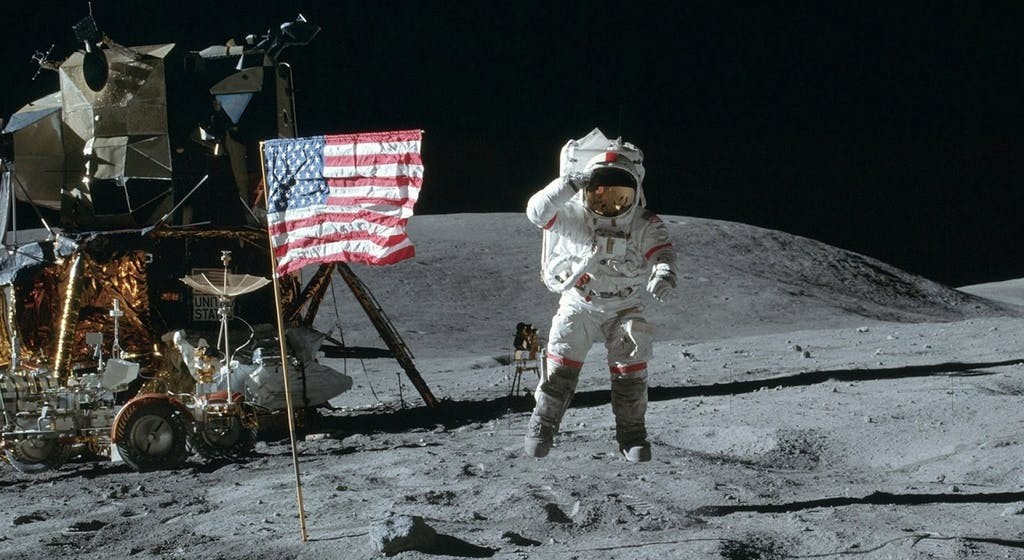Last week, one of those controversies that could only exist in the age of the Twittersphere set the American commentariat briefly alight. "First Man", a biopic of Neil Armstrong currently doing the festival circuit, irked the patriotic by not depicting America’s proudest moment – the planting of the stars and stripes on the surface of the moon. Little Marco Rubio, former presidential contender (till the Don showed him the door), tweeted out that the movie was "total lunacy" for the admission and reminded everyone that Americans had paid for and built the rockets and that "it wasn’t a U.N mission".
It's always good to see elected servants of the people weighing in on matters of vital importance.
Like movie criticism.
Of course, like most who take umbrage at the content of movies, he hadn’t actually sat through the thing. But in his clumsy, patriot signalling way, did he have a point?
Well, in Dr Black’s estimation, yes and no.
The filmmaker’s response that the movie was about Armstrong’s "inner journey" and star Ryan Gosling’s claim that the moon landing "transcended countries and borders" seem less convincing than the current economics of Hollywood – the American box office is dwarfed by the overseas take including the growing Chinese market whose punters (or their Government) don’t take kindly to American chest thumping. Or flag waving.
They aren’t the only ones.
Since the MAGA and Brexit phenomena (or as I like to call it, the mass outbreak of common sense), those of the lefty persuasion have shown an increased queasiness about the regalia of patriotism - flags and anthems. NFL players who have played one too many games without a helmet "taking the knee" during the Star-Spangled Banner. American schools banning American flags. Self-hating brits throwing mini Union Jacks on the floor in disgust when café owners add them to their toothpicks during the football world cup.
What exactly is their deal? Why is identifying yourself as belonging to a group with a shared history, values, and culture automatically assumed to be a negative thing?
The British writer David Goodhart has an answer. In his book "The Road to Somewhere: The Populist Revolt and the Future of Politics" he explains how the forces of globalisation have split us all into two tribes with opposing interests. "Anywhere" people, educated and mobile, as at home in New York as New Lynn, valuing the commonality of humanity and "Somewhere" people, less educated (but not less intelligent, an important point that), more connected to their local communities, and clinging to the ideas of culture and national identity.
Trouble is the Anywheres (in Goodhart’s estimation, 20-25% of the population), control the narrative of the media. That’s how a pensioner waving a Union Jack or a Trump voter with a stars and stripes t-shirt becomes a xenophobic, racist, troglodytic embarrassment.
Embarrassment is what the Anywhere elites feel at the very concept of the Nation State. By now, according to progressive doctrine, we should have evolved into a Star Trekian utopia where Uhura and Sulu have control of the bridge and Kirk softly intones kumbaya in the background. Warp speed ahead to a time of no races, no nations, and no conflict.
This brings us back to the Moon. Ryan Gosling should stick to looking prettier than most the women I’ve slept with. The moon landing was precisely about "countries and borders". Two in particular. The U.S of A and the Soviet Union. The landing was the crowning achievement, not to mention the victory lap (orbit?), of the American experiment.
Nation states matter beyond mere geographic markers; they embody the values and ideas of humanity. Sometimes opposing ones. The U.S.A and the U.S.S.R were (are) both "proposition nations" literally founded on principles – the U.S from its inception, the U.S.S.R from the early days of the communist revolution. The clash of these principles – individualistic capitalism and collectivist communism – reached its zenith in the cold war and the final play-offs, the grand final, of that was the space race.
Somewhat ironically, the moon landing did depend on Big Government action. The total government spend was 25.4 billion dollars (about 150 billion today). However, the bulk of this went to existing private contractors like I.B.M and General Motors. The engine of private enterprise got the U.S to the moon as sure as rocket fuel did.
So, when Armstrong claimed his Luna stroll was "one giant leap for mankind" (he fluffed the line, missing the 'a' before man, but imagine the stage fright, only the whole of humanity listening), he was of course speaking of a transcendent moment for all of us clothed bipedal primates.
But little Rubio is also right.
American exceptionalism got us there.
American exceptionalism – the good (Pax Americana, free markets) the bad (internet porn – hey my wife reads this) and the indifferent (Dunkin’Donuts, Kim Kardashian) – contrasted with the monochrome misery of the Soviet slave-state.
Both nation states.
One amplified the human spirit so that for the first time we felt no longer bound to this planet and the other almost crushed it beneath bread queues, gulags and Ladas.
